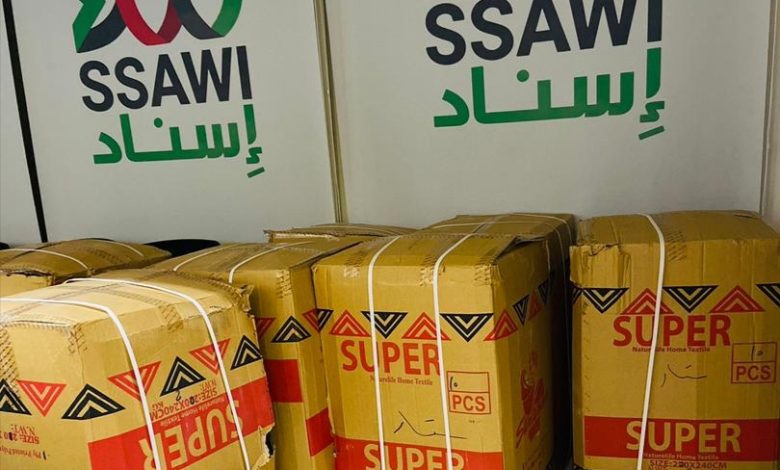Supporting Sudanese Affected by War… Actions to Alleviate Burden of Disaster

Report – Nahid Oshi
Supporting Sudanese people affected by the war is an urgent necessity imposed by the circumstances of the war that broke out on April 15 of last year and wiped out the green and dry land in the conflict areas of Khartoum, Darfur, and the Gezira.
The damned war left a dire humanitarian, economic, social and political reality and made Khartoum a region of complete destruction of all infrastructure. The Sudanese lost their property and money and were displaced to safe states and then fled as refugees to neighboring countries for fear of war.
One of the first countries to which the Sudanese took refuge was the State of Egypt, which opened its doors to the Sudanese people and extended the bonds of brotherhood and love, but the economic conditions and crises that affected all the economies of the world faced those fleeing the fires of war.
Open doors
The Sudanese embarked on an initiative to support the Sudanese affected by the war, and they sought to network with Egyptian and international civil society organizations and with officials in the Republic of Egypt in order to support and assist the Sudanese in Cairo.
The Secretary-General of the initiative, Amira Al-Fadil, revealed the initiative’s efforts to support the Sudanese affected by the war by providing financial and in-kind support and providing health, clothing, shelter and education services. She said during the brainstorming meeting with Sudanese media professionals in Cairo that the initiative was launched and reached many destinations thanks to the contribution of the Chairman of the Supreme Committee of the Initiative, the former Egyptian Prime Minister. Essam Sharaf opened the doors to the initiative, adding, “Egypt opened its doors to the Sudanese during the crisis.”
Specialized committees:
Amira revealed that the initiative has 12 specialized committees in the fields of health, media, law, and other important committees, and she said, “We are seeking to transform it into a permanent association, as the League of Arab States has agreed to give it the form of a specialized union, and we will be part of the specialized unions affiliated with the Economic Council of the Arab League, which gives us the opportunity to work with 22 nation.
She stressed that the Sudanese embassy in Cairo is an essential part of the initiative, and said, “We are very happy about Lieutenant Colonel Imad Adawi, the new ambassador.”
Regarding the financing of the initiative, Amira pointed out the assistance of Egyptian institutions in support, in addition to establishing the headquarters, through a Sudanese businessman, Sudanese doctors, and Sudanese businesswomen.
Treatment costs
Below, the health sector revealed the provision of 200 to 400 thousand Egyptian pounds to cover the costs of kidney transplantation, in addition to the Sudanese Ministry of Health’s contribution to saving the cost of dialysis. He added, “We reached an agreement with the Sharia Society in Egypt to provide two centers to cover 50% the treatment costs, and she confirmed that the challenge remains.” It exists in light of the need to provide 100 thousand Egyptian pounds per month with the increase in arrivals.
She revealed that the Food Bank provides about 5,000 cartons of food commodities per month, in addition to support from philanthropists.
She disclosed the purchase of land, allocating it to cemeteries, and offering it as endowment shares, as the first and second were filled, and there are efforts to buy a third.
Social transformation:
She described what happened during the war as a social transformation of Sudanese society and families, and said, “There are major changes that must be studied regarding effects of the war on Sudanese society and Sudanese families.”
Sudanese concerns
For his part, Salah Omar Al-Sheikh, representative of the Sudanese Journalists Union, confirmed that the meeting is a good opportunity to discuss issues related to female journalists while taking into account the concerns of Sudanese people affected by the war. He pointed out that women’s journalism began early since Bint Al-Wadi magazine in the forties with the beginning of journalistic work and after that the women’s pages were launched, but women’s leadership in the Journalist work started late, and asked female journalists to take the initiative.
Preserving dignity
On the other hand, Lamia Abdul Ghaffar, head of the Training and Employment Committee, revealed that Isnad had been targeted
To provide food, clothing, and medicine, preserve dignity, help expatriates, work to restore libraries and museums that were destroyed, create a database for Sudanese families, especially in areas of fragility, and conduct studies of special cases, in addition to vocational and practical training, pointing to partnerships with the League of Arab States, the Arab Union for Sustainable Development, the Pharmacists Union, the Ministry of Social Development in Sudan, the Arab Youth Union, the Union of Journalists, the Sudanese Bar Association, and the Arab Union for the Development of Sudanese Exports.
She revealed the provision of 5,000 opportunities for Sudanese youth to work in factories in coordination with the Egyptian Workers’ Association, in addition to job opportunities in the Al-Arabi Group and the Arab Women’s Foundation.



